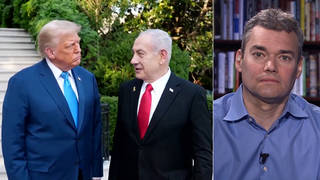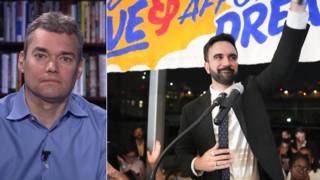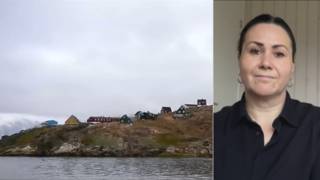
We speak with investigative journalist Antonia Juhasz about how President Trump’s major tax and spending bill hurts environmental justice efforts in Louisiana communities affected by the climate crisis and pollution from oil and gas facilities. The Trump administration had already canceled much of the funding for local environmental monitoring and advocacy, and the so-called Big, Beautiful Bill further entrenches the power of the fossil fuel industry. “It’s a frontal assault on environmental and climate justice, and it will set us back significantly unless we take action to confront the climate crisis,” says Juhasz, who wrote about the bill’s impact for Rolling Stone.
Transcript
AMY GOODMAN: At the news conference following Trump’s so-called Big, Beautiful Bill, Republican Speaker Mike Johnson of Louisiana answered a question from Rolling Stone reporter Antonia Juhasz about how the law’s gutting of environmental and climate justice funding from the Inflation Reduction Act would impact rural Louisiana. This was Johnson’s response.
SPEAKER MIKE JOHNSON: I think a lot of the estimations about what this legislation would do in a negative manner to communities in my state or any other are far overblown. I can tell you that this bill is going to be a great thing for everybody around the country, my constituents especially. What’s good for Louisiana is good for America. We’ve got great tax policy here. I think they’re going to feel this pretty quickly. Wages will rise. I think household income will go up. I think the job participation rate will — will increase dramatically. I think unemployment will be low. We’re going to duplicate what we did in the first Trump administration. Remember, at the first two years, y’all have heard me say a thousand times, it’s objectively true we had one of the greatest economies in the history of the world. And we’re going to do that again, except this time much more comprehensively. We did tax cuts and regulatory reform, and that brought about a resurgence of the U.S. economy. That’s about — that’s what’s going to happen here. It’s about to happen on steroids. And we can’t wait for that to happen. This is jet fuel for the economy, and all boats are going to rise.
AMY GOODMAN: So, that was House Speaker Johnson’s response to reporter Antonia Juhasz, who’s doing — just published a piece for Rolling Stone magazine. One of the groups who will see their funding cut is Inclusive Louisiana. Antonia reports the group received a half-a-million-dollar grant with local partner groups, Louisiana Bucket Brigade and Rural Roots. The grant was awarded through an Inflation Reduction Act environmental and climate justice block grant program that provides financial assistance to groups working to address local environmental or public health issues in their communities, the grant terminated in May by the Trump administration. This is an ad they had made for their campaign, Imagine St. James Parish.
BARBARA WASHINGTON: For too long, petrochemical plants have been poisoning our people, and with the approval of the St. James Parish government.
MYRTLE FELTON: Building more facilities that spew toxic chemicals into historically Black communities.
BARBARA WASHINGTON: But now we are reclaiming our future. Together, we can imagine a pollution-free St. James Parish, and we can build an inclusive economy. What can you imagine?
MYRTLE FELTON: Tell us at ImagineStJamesParish.org. Paid for by Inclusive Louisiana.
AMY GOODMAN: For more, we are joined by Antonia Juhasz in Washington, D.C., where she followed the budget bill negotiations, award-winning, longtime investigative journalist covering oil and energy and regular contributor to Rolling Stone magazine, her latest piece, “They’re Fighting Polluters. Trump’s Tax Bill Guts Their Funding: Across Louisiana, communities are bracing for the tax bill’s massive cuts to critical funding for local community organizing and resilience.” Among her books is The Tyranny of Oil.
Antonia, welcome back to Democracy Now! We just have a few minutes before we talk about what’s happening in Gaza, and we wanted to ask you — you got in that last question to the House speaker. Explain what you were asking about and his response?
ANTONIA JUHASZ: Yeah, so, I had been traveling across rural Louisiana to investigate the impacts of the tax bill on environmental and climate justice, and environment more broadly. And I had asked the speaker: What would he say to those communities that are going to be cut off now as a result of the tax bill? And you heard his lengthy response.
The facts are that this bill zeroes out, to the best extent that it could do, the Inflation Reduction Act, Biden’s signature climate bill. It includes the zeroing out of environmental and climate justice grants that — some 800 of them, and programs that went to help local frontline communities confront polluters in their area. This bill has been called the worst environmental bill in U.S. history.
You started with the Texas floods. We know that the climate crisis kills. We also know that we have remedies: cut fossil fuels, transition to localized renewable energy and support frontline communities. Those programs have essentially been erased, to the best extent that they could, in this tax bill to remove tax incentives that would help us support solar and wind energy manufacturing. Tax breaks for consumers, producers, those were entirely stripped away to cut out that financial support for the solar and wind transition. Tax breaks, billions of them, to the fossil fuel industry. And remember, this bill extends all of those tax cuts from 2017, which had already brought billions of dollars to the fossil fuel industry, and just gives them new benefits. One of the perks that Lisa Murkowski got for voting for the bill was opening up the Alaska National Wildlife Refuge to oil and gas drilling. There’s other provisions that reduce the tax — the royalties that the U.S. would get from drilling in public lands, so a big giveaway and an opening the door to more production. It provides more tax breaks to the fossil fuel industry. It eliminates rules, for example, that were trying to address methane emissions.
It’s a Christmas tree for the fossil fuel industry. It’s a frontal assault on environmental and climate justice. And it will set us back significantly, unless we take action to confront the climate crisis. It was one big, additional boondoggle for the fossil fuel industry and to harm local environmental and climate justice organizing and our national and international attempts to confront the climate crisis.
AMY GOODMAN: Antonia, the Environmental Protection Agency, the EPA, put 139 workers on leave after they publicly criticized Trump’s environmental policies and signed a declaration of dissent last week, many of them high-level people in the EPA, were given like 10 minutes to leave their offices. Talk about what this declaration of dissent was.
ANTONIA JUHASZ: So, I interviewed — I’ve been interviewing for months Environmental Protection Agency staff. So, the Trump administration has been working, through the DOGE process, the EPA to gut environmental, climate, environmental justice rules. It’s been losing in court, left and right, in those efforts. They have been found to be illegal. So, therefore, the administration is trying to use — or, did use, excuse me, the tax bill, to achieve through that bill what it was losing through the courts.
EPA employees working on environmental justice, working on climate, working on protecting our air, our water, protecting us from pollution, have been trying to speak out. They’ve been put on administrative leave. Many also accepted their early buyouts, because they didn’t want to have to deal with this administration. Others have been increasingly speaking out. And this letter that came out was the largest organizing of those EPA employees to state their opposition to what was happening. And the Trump administration then put 144 of them on administrative leave.
AMY GOODMAN: And we will link to that letter, that declaration of dissent, at democracynow.org. Antonia Juhasz, thanks so much for being with us, longtime investigative journalist. We’ll link to her Rolling Stone piece, “They’re Fighting Polluters. Trump’s Tax Bill Guts Their Funding.”
Next up, we’ll talk about Gaza. Could there be a truce? As the Israeli prime minister meets with President Trump in D.C. today, we’ll speak with Dr. Feroze Sidhwa, who’s volunteered in Gaza and writes, “Hospital Attacks in Gaza and Israel: What Counts as a War Crime?” Stay with us.
[break]
AMY GOODMAN: “Sowa” by Fatoumata Diawara.













Media Options